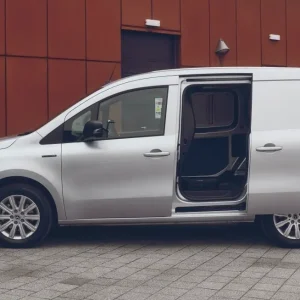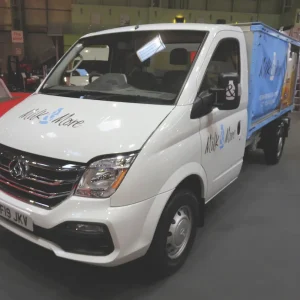Ford is embracing the switch to battery-electric technology with a vengeance.
With E-Transit now in production and taking pride of place on the Ford stand, the manufacturer has just unveiled the E-Transit Custom. Offering an estimated range between recharges of up to 236 miles, it will be in build in 2023, with an electric Transit Courier set to join the zero-emission family in 2024.
As well as developing its product line-up, Ford is enhancing its support services.
The blue oval is rolling out a whole host of digital initiatives under the Ford Pro banner for its van clients in a bid to help them manage their operating costs more effectively and reduce downtime. Areas covered include software, electric vehicle charging, servicing and finance, the aim being to provide businesses with a single platform they can use to run their fleets.
Ford is at pains to stress that its support package applies to diesel and petrol as well as electric vehicles. However, it has clearly crafted it to cater for the coming switch to battery power.
Big groups such as DPD are already coming to the zero-emissions party. The parcels giant ordered 1,000 E-Transits earlier this year.
But where does the rush to battery-electric leave small businesses? Will the local plumber, carpenter and plasterer find that an electric Ford light commercial has sufficient range to meet their typical daily needs?
No question about it says Ford of Britain director, commercial vehicles, Mandy Dean. “Remember that the average daily journey for a van is 69 miles,” she observed.
Local trades people whose vehicles are parked in the street for much of the time while they are working inside somebody’s house don’t travel anywhere near that distance.
“So far as charging is concerned, if your house has got a drive then there is nothing to prevent you having a wallbox installed in your garage,” she continued. You can plug your electric van into that, and recharge it overnight ready to start work the following day.
“Furthermore, Ford can arrange access to 16,000 publicly-accessible charging points across the UK,” Dean said. So you can still charge up your light commercial even if you live in a flat or a terraced house.
Nor need for customers to worry that their vehicle’s battery will fail prematurely, leaving them with an eye-watering bill for a replacement. “We warrant our batteries for eight years/100,000 miles,” she said.
One key advantage of switching to battery-electric vans is that they should require 40% less servicing than their diesel counterparts. A drawback is that they remain considerably more expensive to acquire.
Electric technology is getting cheaper all the time though says Dean, so the price gap between battery and diesel vans should steadily narrow. However, she was unable to say when they will reach price parity; and prices of all light commercials are soaring anyway as the cost of energy and raw materials continues to escalate.
“The industry used to impose retail price increases of around 1% to 2% a time,” she said, “now it’s more like 6% to 8%.”
Shortages of key components such as semi-conductors mean customers are having to wait many months for their vehicles to be delivered; a problem that is afflicting all manufacturers. At the time of writing anybody who ordered a diesel Transit Custom could expect to wait until March 2023 before delivery.
“We offer customers full price protection,” Dean stressed. In other words, the price agreed today will not go up, even though delivery may be months away.
It is interesting to note that anybody who orders an E-Transit is likely to get it significantly quicker. Delivery times of three to four months were being quoted at the CV Show.





